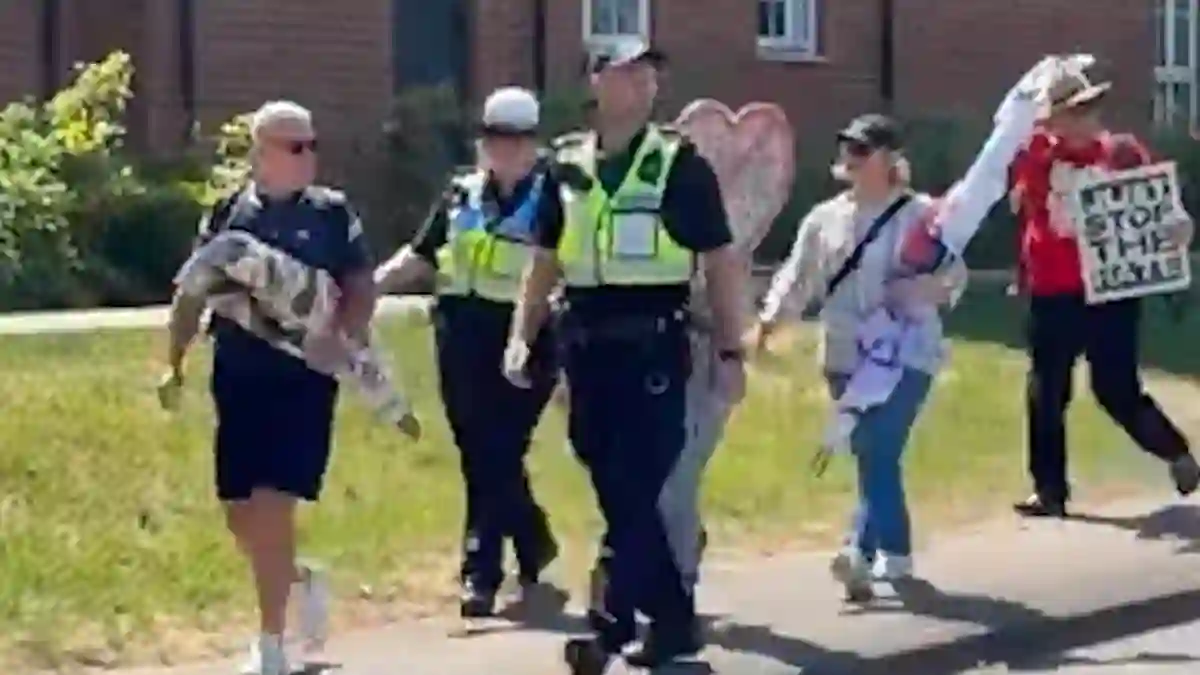As tensions flare across the UK over the use of hotels to house asylum seekers, a second police force has come under scrutiny—this time in Hampshire.
Officers have been criticised for escorting pro-migrant counter-protesters to a demonstration, sparking a wider national conversation about the role of law enforcement in managing politically charged protests.
Video Footage Sparks Fresh Criticism
Footage recently surfaced showing Hampshire police officers walking alongside activists to the Potters International Hotel in Aldershot, where asylum seekers are currently being accommodated.
The video, captured on May 10, has reignited concerns about whether police are unintentionally “facilitating” protests rather than simply maintaining public order.
This follows a similar controversy in Essex last week, where officers were filmed escorting left-wing demonstrators to another protest site in Epping.
That incident led to a sharp backlash—including a public call from Reform UK leader Nigel Farage for Essex Police’s chief constable to resign, a demand he flatly rejected.
Fears of Escalation Across the UK
Police campaigners and political figures have since warned that scenes like the one in Epping—where violence broke out—could become a “signal flare” for more widespread unrest over the summer.
Sixteen arrests were made following that demonstration, and five individuals have since been charged with violent disorder.
Authorities say that a small group of agitators hijacked the peaceful protest, turning it into chaos.
Officers described their actions as “thuggish” and “criminal.”
Left-Wing Group at Centre of Counter-Protests
In the Hampshire video, one of the pro-migrant activists is seen holding a placard from Stand Up to Racism, a campaign partly backed by trade unions and led in part by suspended Labour MP Diane Abbott.
The group has announced plans to increase its presence at migrant hotel protests this coming weekend.
But their presence has been controversial. In Epping, some anti-asylum seeker demonstrators blamed the arrival of counter-protesters for the violence that erupted.
Clashes between opposing groups have raised concerns that protests are escalating beyond peaceful demonstration.
Police Defend Their Actions Amid Public Backlash
Former Conservative leader Sir Iain Duncan Smith criticised the police response, telling The Telegraph, “It is simply not the police’s job to facilitate protest.”
He argued that escorting counter-protesters increases the risk of disorder, saying, “If you come to counter-protests, you’re asking for trouble.”
On the other side of the debate, policing campaigner Norman Brennan—himself a retired London officer—defended the officers involved.
Speaking to MailOnline, Brennan said police are simply doing their jobs and have a duty to protect everyone, even if the optics upset some people.
“You can’t slam the police for trying to keep the peace,” Brennan said.
“It’s like managing rival football fans—you don’t pick a side, you just try to stop violence from breaking out.”
A Balancing Act Between Protest and Public Safety
According to Hampshire Constabulary, the geography of the Aldershot protest site played a big role in how things unfolded.
The area where protests are held backs directly onto a busy A-road.
That meant there was really only one safe route for people arriving from the town centre or nearby estates—so police had to manage that flow carefully.
In a statement, Hampshire Police said their role was to inform attendees where they could protest safely.
They emphasised that the rights of protesters must be weighed alongside the rights of residents to live without unnecessary disruption.
Previous Protests in Hampshire Have Remained Peaceful
Interestingly, Hampshire police also noted that past demonstrations involving Rushmoor People First—along with counter-protesters—have concluded without any major disorder.
They credit this success to proactive communication between organisers and police, and tactical decisions made on the ground.
Still, the growing wave of protests, combined with rising political temperatures, has made this an increasingly complex challenge for law enforcement.
